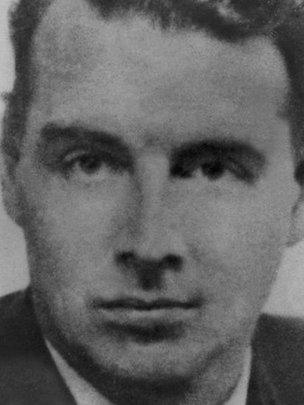'Cambridge spy' Guy Burgess recording broadcast
- Published

Guy Burgess died in Moscow in 1963
The only known audio recording of the voice of "Cambridge spy" Guy Burgess has been broadcast for the first time.
The tape, released by the US government to City University London researchers, was recorded in New York in 1951 and broadcast on Channel 4 News., external
In it he describes a 1938 meeting with Winston Churchill in which they share despair over the Munich agreement which Chamberlain had signed with Hitler.
The recording was made just three weeks before Burgess' defection to Russia.
Former Cambridge student Burgess worked for the BBC, during which time he was also employed by MI6 and the Foreign Office in Washington. But he was one of a number of Cambridge graduates working as double agents and passing official secrets to their spymasters in Moscow.
Audio recording featuring Guy Burgess - Courtesy Channel 4 News
Burgess was recalled from the US in 1950 for "serious misconduct" and subsequently he and fellow spy Donald Maclean vanished. They emerged in the Soviet Union a few years later and Burgess died in Moscow a decade later.
In the tape he is speaking at an informal dinner, and recounts the day in 1938, when he visited Mr Churchill's home in Chartwell, Kent, who was then at odds with the government over how to tackle Nazi Germany.
In it he says: "I am now recording. I'm not in the least shy. I am extremely tired. I am now recording for the third time - because I think the story is of interest - my interview with Mr Winston Churchill in September 1938."
The recording includes mimicry and impressions of Churchill's side of the conversation.
In it Burgess says that Churchill says he has received a letter from Edvard Benes, the leader of the Czechoslovakian independence movement asking for help - but he does not know what he can do, saying: "Here am I, an old man, and without party. What help shall I give. What assistance can I offer?"
Burgess says he told him: "And I said the right thing at the moment, 'Oh Mr Churchill, don't be so downhearted. Offer him your eloquence. Stump the country,' I said. 'Make speeches. Awaken them,' I said, 'to the issues at stake,' I said, addressing him as though he was me. And he was rather pleased by that, I think, because he warmed and said 'Ah yes, yes, my eloquence. That, indeed, Herr Benes can count on.'"
Writer Michael Dobbs, who wrote a TV play about Churchill's meeting with Burgess, told Channel 4 News: "This is a real bit of history and it's history come alive in the words of one of the participants. You know, I'm almost trembled as I read this."
The City University researchers, Prof Stewart Purvis and Jeff Hulbert, said they had found a reference to the recording in FBI files in Washington.
Prof Purvis said: "We thought that if a transcript existed it was obvious that at some point a tape existed and might still exist. So Jeff put in a freedom of information (FOI) request on our behalf to both the British and American authorities.
"The British came back saying they didn't know where any such tape was, but nine months after our request the FBI told us they had put "a release" in the transatlantic mail. It came in the Christmas post, and on our first day back after the holiday break we found an FBI envelope sitting in my post box at City University."
Known by the KGB as the "magnificent five", the group of students recruited at Cambridge University are not thought to have been motivated by financial gain but by the belief that capitalism was corrupt and that the Soviet Union offered a better model for society.
- Published21 October 2013
- Published26 October 2012
- Published30 June 2011